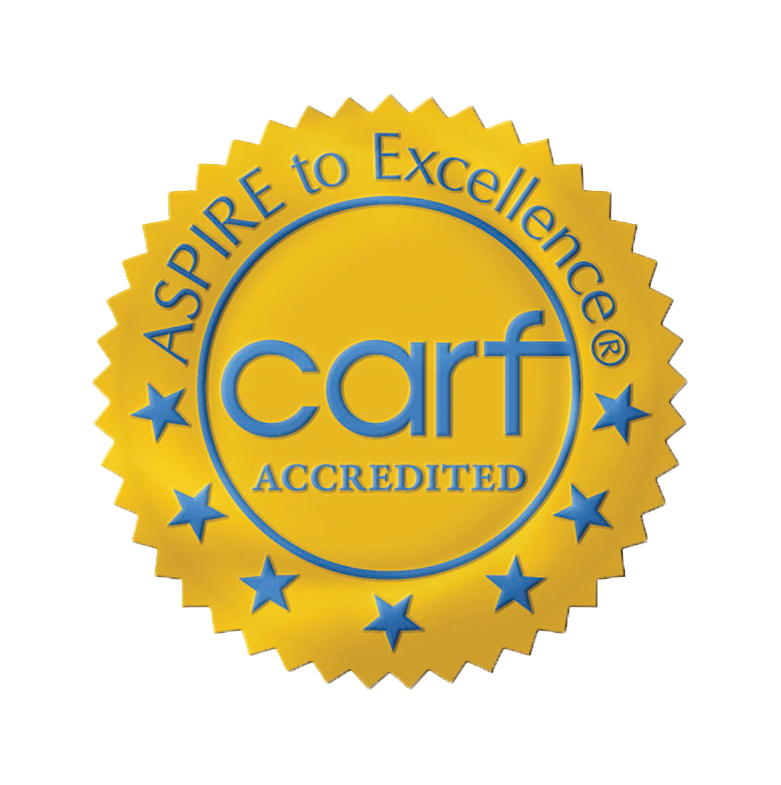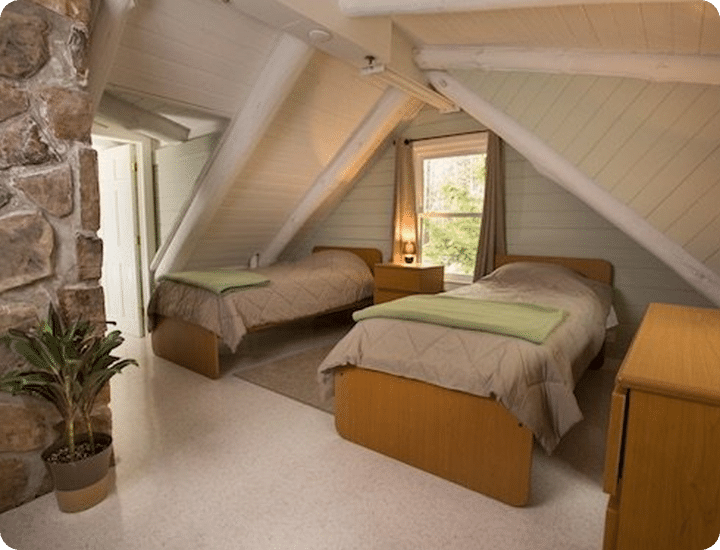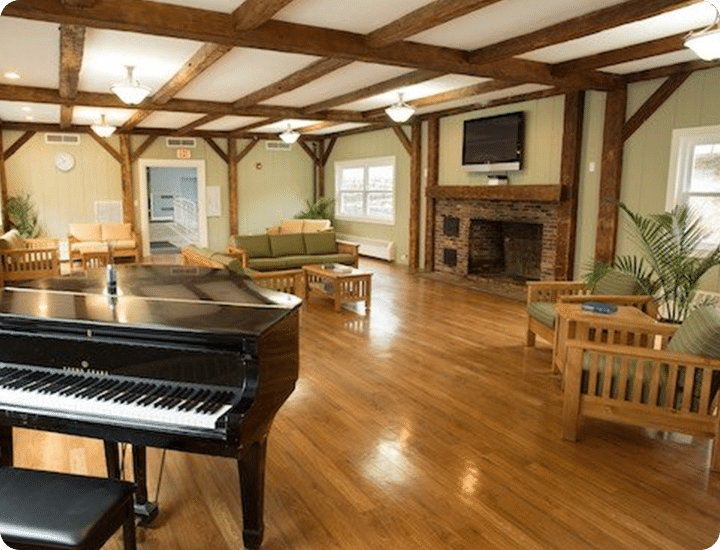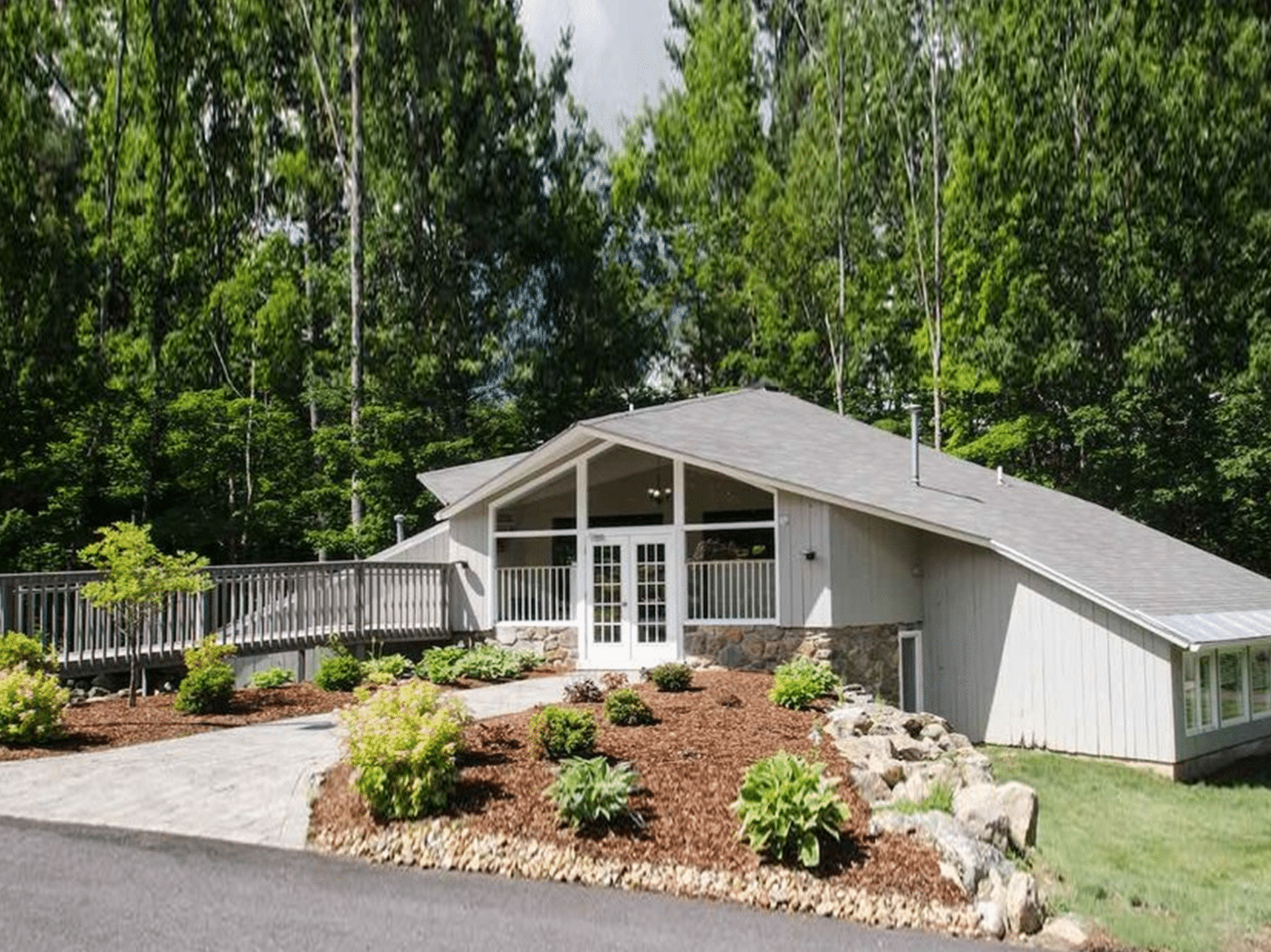Effective Addiction and Mental Health Treatment
Granite Recovery Centers has inpatient drug and alcohol rehab and mental health treatment facilities across New Hampshire. Our inpatient drug and alcohol treatment programs have earned the seal of the Commission on Accreditation of Rehabilitation Facilities (C.A.R.F.). Through our inpatient residential drug rehab centers, Green Mountain Treatment Center in Effingham, The Granite House in Derry, and our primary mental health treatment facility New Freedom Academy in Canterbury, Granite Recovery Centers offers a comprehensive system of care that can evolve with our clients. We employ what we call “Recovery Education & Skills Training (R.E.S.T.),” which is a comprehensive lecture, discussion, and action-based curriculum developed by integrating time-tested 12 Step principles with evidence-based clinical practices and the personal experiences of men and women in recovery from Substance Use Disorder. This transformative program has proven to be effective with our clients time and time again.

Evidence Based Clinical Practices in Addiction Treatment and Recovery
Our Evidence Based Practice – Model of Care Curriculum (EBP) consists of scientifically-supported psychotherapeutic approaches that help clients identify, dissect, and reprogram harmful thoughts and behaviors. Clinical therapies used at a GRC drug and alcohol rehab program may include Cognitive Behavioral Therapy (CBT), Dialectical Behavior Therapy (DBT), Eye Movement Desensitization and Reprocessing (EMDR), Trauma Therapy, and Grief & Loss Therapy. Our trained and experienced clinicians leverage these therapies to help addicted adults approach and process difficult and painful issues related to their substance use origins and triggers. When integrated with our structured 12-Step curriculum, these clinical therapies can play an instrumental role in recovery. Read more about EBP for addiction.
Watch Jesse’s Inspiring Story
from Addict to Admissions Specialist.
Primary Mental Health Treatment
Granite Recovery Centers is now offering primary mental health treatment for adult men and women in New Freedom Academy in Canterbury, NH’s beautiful countryside. Our residential center provides a specialized and effective program for clients struggling with mental health disorders and underlying substance use. Our multidisciplinary treatment team serves clients with anxiety disorders, depression, schizophrenia, bipolar disorder, obsessive-compulsive disorder, and post-traumatic stress disorder. Our team is comprised of highly skilled medical professionals, psychiatric professionals, and masters level therapists, as well as individual case management and peer-to-peer support.
We proudly offer the following therapies:
- Individualized Therapy
- Illness Management & Recovery
- Wellness Recovery Action Plan
- Cognitive Behavioral Therapy
- Dialectical Behavior Therapy
- Anger Management
- Seeking Safety
What Is A 12-Step Centered Program?
12-Step centered refers to the incorporation of the 12 Traditions of Alcoholics Anonymous or Narcotics Anonymous into our NH drug and alcohol rehab center. While some addiction rehab programs pay little more than lip service to the 12 Steps (passing along a book or recommending that the client seek out and attend A.A. group), the 12 Steps are core to our treatment approach.
Our curriculum begins on day one with each client being immersed in teachings that include self-acceptance, giving back, making amends, and active participation in the 12-Step community. Read more about 12-Step centered drug rehab.
12-Step Programs for Addiction Treatment
12-Step programs can approach addiction in a slightly different way. Using the 12 Steps of Alcoholics Anonymous, treatment centers structure classes and group therapy (non-clinical) around “working the steps” to understand addiction and resolve the triggers or “compulsion” that drives substance abuse. Patients are asked to really explore who they are, their addiction, why they use, and what has resulted in their lives because of addiction. With this soul-searching and self-awareness, they are able to make amends with addiction as a disease and find a life of purpose without drugs or alcohol.
Integrated 12 Steps and Clinical Addiction Therapy
As one might guess, drug and alcohol treatment centers that use both approaches together are integrated. The integrated approach is hugely successful for many because it offers the actionable plan of the 12 Steps, but backs it up with some solid psychotherapeutic sessions where patients can explore the root and results of their painful addiction.
Treating Co-Occurring (Dual Diagnosis) Mental Health Disorders
Addiction is more often than not a symptom of underlying mental and psychological issues. In fact, at least half of all people who suffer from a substance use disorder also suffer from a psychological disorder or have experienced a significant emotional or physical trauma, hence the term co-occurring disorders. Inpatient and outpatient environments can provide clinical treatment for co-occurring disorders so that both the mental disorder and the substance use can be addressed. In order to best serve a client with a co-occurring mental disorder in a drug rehab setting, evidence-based clinical treatment must be individualized to both the client’s addiction and his or her mental disorder. Read more about integrated treatment for co-occurring disorders.
Our Full Continuum of Addiction Care
In a full continuum of care, clients are tracked and guided over time as they progress through a comprehensive array of
addiction treatment services spanning all levels and intensity of care.
Granite Recovery Centers operates 12 facilities throughout New Hampshire, each playing its own specialized role in our full end-to-end continuum of addiction care including:
- Medical Alcohol and Drug Detox
- Medication Assisted Treatment (MAT)
- Primary Residential Treatment
- Partial Hospitalization (PHP)
- Extended Care
- Structured Sober Living
- Intensive Outpatient Treatment (IOP)
- Outpatient Treatment (OP)



Medical Drug and Alcohol Detox in New Hampshire and Maine
Medical Detox at our NH drug and alcohol rehab center is typically the first step in the process of recovering from drug or alcohol addiction. We also medical detox treatment at our Liberty Bay facility in Portland, Maine. Addiction is a disease of both the mind and the body. Medical detox deals with both mind and body allowing clients, under medical supervision, to comfortably cleanse their systems of drugs and alcohol so that they can be strong, alert and clear minded as they proceed into primary treatment. Granite Recovery Centers provides medical detoxification for people who do not need immediate medical intervention, are not a danger to themselves, and are capable of self-evacuation in the event of an emergency. Read more about medical detox programs.
Medical Detox at our NH drug and alcohol rehab center is typically the first step in the process of recovering from drug or alcohol addiction. Addiction is a disease of both the mind and the body. Medical detox deals with both mind and body allowing clients, under medical supervision, to comfortably cleanse their systems of drugs and alcohol so that they can be strong, alert and clear minded as they proceed into primary treatment.
- Utilize group and individual clinical therapies
- Require immersion in the 12-Step curriculum
- Require that clients do not use drugs or alcohol
- Are accountable for their actions
- Perform basic chores
Extended Care Rehab: Aftercare, Alumni, and More
Our four extended care facilities provide additional time for clients who desire or require structured support and therapy while solidifying sober concepts, and propelling them into early recovery towards a life of abundance. Typically a “step down” stage of the continuum for clients successfully discharging from a residential primary treatment program, extended care provides clients extended time to work on the concepts and skills learned in primary treatment while preparing for eventual independent living.
Intensive Outpatient Drug Rehab Program
Outpatient drug rehab programs are often the last step of treatment and coincide with full immersion back into the real world. Intensive outpatient treatment is also implemented as part of our extended care programs where clients reside at one of our
extended care facilities and attend Intensive Outpatient Programs (IOP) at a neighboring facility. Outpatient programs can vary in intensity of support and programming. IOPs generally require clients to participate in continued clinical, holistic, and 12-step sessions at a minimum of 10 hours a week. Read more about outpatient drug rehab.
New Hampshire Sober Living
Our four sober living homes are residential settings that provide safe, supportive, structured, and sober environments for clients in early recovery. In the treatment continuum, sober living typically follows extended care although some elect to enter sober living directly following primary treatment. Sober living acts as a transitional buffer for clients starting work or school and moving about in the “real world”. Structured yet independence-focused sober homes provide an environment where clients can practice and fine tune life, their accountability, life skills, and sober concepts. Read more about sober living.
Holistic Therapies for Addiction Treatment
Holistic therapies are used to treat and unify the mind, body, and spirit when one or all are unwell. Body-centric therapies such as yoga, meditation, and exercise help quiet the mind, strengthen the body, and center the whole person spiritually. Holistic therapies at GRC compliment our hybrid clinical/12-Step drug and alcohol rehab program, help clients resolve physical and mental imbalances, and find healing through mindfulness and self-acceptance. Read more about holistic therapies for addiction.

If you’re thinking about going to admitting to a drug rehab facility and have never been before, of course, you have a multitude of questions. Facing any new experience can be scary, and especially, if that new experience presents a permanent life change. We’ve put together a list of some of the most important things to know about drug and alcohol treatment centers and what to expect while there, to help you better familiarize with the concept.
Detox and Withdrawal Treatment
Some drug and alcohol treatment centers have on-site medical detox services, in which you will be medically-monitored while you go through a bodily withdrawal from the drug you are addicted to. Other facilities will recommend detox if needed, to nearby centers and hospitals that have the medical resources to facilitate a managed detox. Note: Not all clients are required to detox under medical supervision, however, in some cases, depending on the level of use and/or specific substance, monitored detox is required to avoid potential fatal consequences. You should consult with rehab staff to determine if medically-supervised detox is right for you, prior to beginning inpatient drug rehab.
Your Personalized Approach to Addiction Treatment
Depending on what kind of drug rehab you choose for your addiction, you will find that some programs are mostly clinical (individual and group therapy), 12-Step-based (ground in principles of AA’s 12-Step program), or a combination of these two. There are different schools of thought in addiction treatment, and the types of drug and alcohol treatment centers available are evidence to this. Granite Recovery Centers tailors individual treatment program approaches for each patient, ensuring the best, personalized addiction treatment.
Clinical Addiction Therapies Offered
For clinical-based programs at the Granite drug and alcohol rehab center, you will typically find a structured environment individual and group therapy sessions focused on determining the underlying causes and triggers of substance abuse, while also reconciling with the negative effects of use. Through behavioral therapy sessions with psychiatric professionals (as well as through group therapy), patients learn how to process underlying causes differently, and respond soberly to triggers. The most common of psychotherapies used in drug and alcohol treatment centers are:
- Cognitive behavioral therapy
- Dialectical behavioral therapy
- Grief and loss therapy
- Trauma/PTSD therapy
Drug and Alcohol Rehab Center Follow-Up Care
Unfortunately, most patients will not gain lifelong sobriety after residential rehab treatment. A habit, an addiction needs time and nurturing to change. This is why many drug and alcohol treatment centers often recommend follow-up care to avoid the potential for relapse. This can come in the form of the following:
- Sober Houses
- Extended Care/Rehab Aftercare
- Intensive Outpatient Programs
While these are options for someone in early recovery (first three months, typically), they are recommended differently, based on where you go. While most treatment facilities will agree that a patient should admit to follow-up treatment, they often don’t agree to what the process should look like. These are the most popular courses of follow-up care after primary treatment at Granite’s NH drug and alcohol rehab center:
- Inpatient rehab to sober house
- Inpatient rehab to IOP
- Inpatient to extended care to sober house to IOP
Statistics show that the more support, resources, and time patients have to focus on recovery in the first year, the better chances of lasting sobriety.
Are Drug Rehab Programs Effective?
For drug rehab or any form of substance abuse treatment to be effective, numerous conditions must be met. Care should not ignore individual differences and circumstances, but should be individualized and address clients’ specific needs. Care providers must pay attention to co-occurring mental disorders that commonly fuel substance abuse, and should offer treatment with clinically-backed interventions offered by licensed clinicians like Cognitive Behavioral Therapy – not enticing promises of recovering at a luxury spa.
Good recovery programs recognize that a 30-day stay is often not enough time for clients to develop the skills and habits needed to overcome their addiction, and should offer longer stays, extended care, sober living, continued treatment and support, or direction to further resources and care once an inpatient residence is over. At Granite Recovery Centers, we pride ourselves on providing top of the line treatment that is evidence based and clinically proven to be the most effective approach to addiction treatment programs. We help to provide the tools, strategies, self-understanding, and community that serve as the foundation for a successful recovery and a happier, drug-free life.






